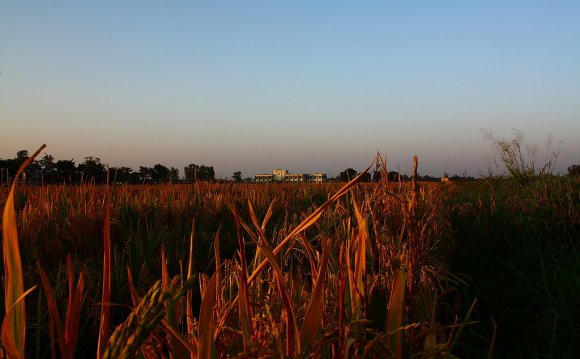

Dr. Deva Kant
Dean, College of Agricultural Engineering, Jabalpur
Ph.: 07(O) ; 07, 2681773 Extn.:311
Fax: 07; Mobile:
ABOUT THE COLLEGE
The College of Agricultural Engineering was established in the Jawaharlal Nehru Krishi Vishwa Vidyalaya, Jabalpur in the year 1967. The campus lies at JNKVV headquarter near Adhartal in Jabalpur on the National Highway NH7. It is situated in agro climatic zone IV known as Kymore Plateau and Satpura Hills.
OBJECTIVES
- To impart education and entrepreneurship skills in engineering; design, development, manufacturing and operation of equipment and technologies of farm operations for crop production, sustainable utilization and management of land and water resources, processing and value addition and efficient use of agricultural inputs and natural resources including different forms of energy in agriculture.
- To conduct research on development of machines/technologies with an aim to mechanize various farm operations as well as post product-processing operations.
DEPARTMENTS
- Farm Machinery and Power Engineering
- Soil and Water Engineering
- Post Harvest Process and Food Engineering
- Agricultural Structure and Environmental Engineering
- Physics and Agricultural Meteorology
- Instrument Development & Service Centre
ACADEMIC TARGETS
- Building excellence in specific strategic areas in education and research in agricultural engineering.
- Promoting holistic higher agricultural engineering education by blending knowledge, skill and attitude mainly through experiential learning.
- Linkages with national and international institutions for faculty and students for excellence in teaching, training, research and extension areas.
- Strengthening of sports and games facilities.
- Providing opportunity to students for visiting prominent institutes in profession of agriculture for technical and cultural interactions.
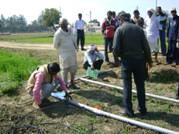 Equal opportunity for boys and girls in teaching, research, extension and management aspects.
Equal opportunity for boys and girls in teaching, research, extension and management aspects.- Extensive efforts for remunerative placement in public, private and public-private partnership mode of job availability.
DEGREE PROGRAMMES
1. B.Tech (Ag. Engg.)
2. M.Tech (Ag. Engg.) and Ph.D. (Ag. Engg.)
- Processing and Food Engineering
RESEARCH MANDATE
- To contribute towards betterment of agriculture in the state in respect of soil conservation, water resource management, post harvest and process equipment, farm machinery and power, agro meteorology, optimization of energy use and agriculture structures through various research programs.
ONGOING PROJECTS
ICAR coordinated research project on
- Post Harvest Technology
- Ground Water Utilization
- Farm Implements and Machinery
- Agro-Meteorology
- Renewable Energy
Other Plan and Non Plan Projects
- Intensive Extension Research Project (IERP)
- National Agricultural Research Project (NARP)
- Seed Processing Plant (SPP)
- Madhya Pradesh Agricultural Research Institute (MPARI)
- Rice Milling Technology Extension Programme
- Agro-advisory Project
World Bank – WRD Sponsored
Madhya Pradesh Water Sector Restructuring Project (MPWSRP) on Improving water Productivity
- Agricultural Thematic Mapping.
- Field demonstration units on modern efficient methods.
- Adaptive trials for improving water productivity.
- Training to members of water User Association.
- Training to officers and field workers of Department of Agriculture, Horticulture and Water Resource Development.
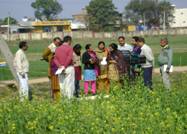 |
|
|
On field demonstration of improved Irrigation practices |
Hand held spectral radio meter exercise |
|
Training on Remote Sensing |
Meeting with members of WUA |
|
Developed and tested Isolators for seat vibration in Tractor
|
|
|
Design, Development and Testing of Groundnut Testa Remover
|
|
|
Bio Diesel
Ground Water in Narmada Basin
|
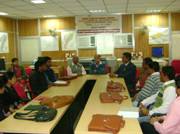 |
Agricultural Thematic Mapping Using Remote Sensing and GIS
The agricultural attribute maps, soil maps, land use/land cover maps, water body maps, crop maps( Kharif and Rabi season) and Geomorphic attribute maps of Tons and Sindh Basin are prepared using satellite imageries and several ground observation throughout the basin during the year 2008-09, 2009-2010 and 2010-2011.
Digital Crop Classification map of Tons Basin
- Area covered 1.25 M ha.
- Five districts
- 35 PAN imageries and 6 LISS III images
Digital Crop Classification map of Sindh Basin
- Area covered 2.75 M ha.
- 5 LISS III images
- Nine district
- Used for Decision support system.
Geomorphic attribute maps of Tons and Sindh Basin
Ground Water Recharge through Haveli Fields – Water quality deterioration
- Water quality deterioration in Narsinghpur and Jabalpur district in last 40 years.
- Na, cu, Cr. So4, Fe, Ho3, Cl, Tn are some of dominant pollutant.
- Domestic waste Nala is the poorest water quality.
Soybean oil expeller with pretreatment
- Size reduction, moisture content and heating increases the oil expression.
- 2.5 mm particle size, 9.5% moisture and heat to 1200C in two passes increases oil recovery to 86%.
Physics and Agro meteorology
- Complete data on weather parameters containing maximum and minimum temperatures, and rainfall was collected of all the agro-climatic zones of M.P. and was analyzed with previous years to assess changes from normal on a long-term basis.
- Last October-early November was found suitable time for chickpea planting with desi chickpea cultivars like JG 315, or JG 11.
- For soybean, JS 97-52 is a good cultivar with planting date from Mid June to first week of July.
- Occurrence of insects is related with weather parameters.
EXTENSION MANDATE
- To identify the gaps in the principle and practices for water management, farm machinery utilization, post harvest technology and food processing and suitable agricultural structure with safe environment and to minimize them through proper extension services and agro-advisory services.
- To study the present status of the contribution of agricultural engineering in state and to seek suitable solutions to problem if any through collaboration with the state and central institutions.
EXTENSION ACTIVITIES
- Participation in Kisan Mela and Kisan Sangosthi
- Lecture in Farmers Training.
- Demonstration and Mechanization in Farmers Fields.
- Establishment Rice Mills and Processing Equipments.
- Popularization of efficient energy devices.
- Manufacturing and supply of small equipments to farmers.
- Adaptive trials on water conservation, efficient modern irrigation equipments and improving water productivity in canal command area.
- Training to members of Water User Association (WUA).
- Popularization of ground water recharge in critical areas.
- Surveys, diagnosis and rectification of pumps and water lifts.
- Training of the officials of Department of Agricultural, Horticulture and Water Resources.
- Akaswani Varta and Television programe.
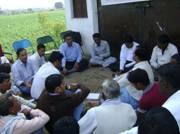
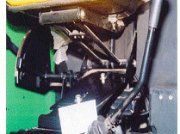
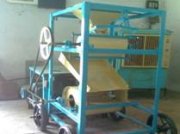
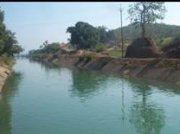
RELATED VIDEO

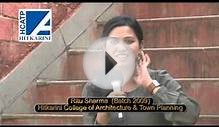
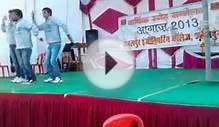

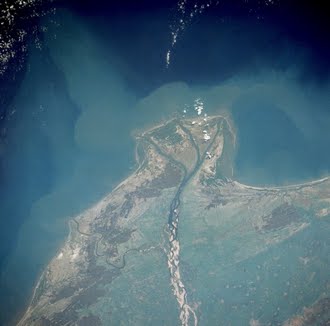 Yazali is a small village located in the costal Guntur District of Andhra Pradesh, India. The population was 3,103 (2001 figures).
Yazali is a small village located in the costal Guntur District of Andhra Pradesh, India. The population was 3,103 (2001 figures).







